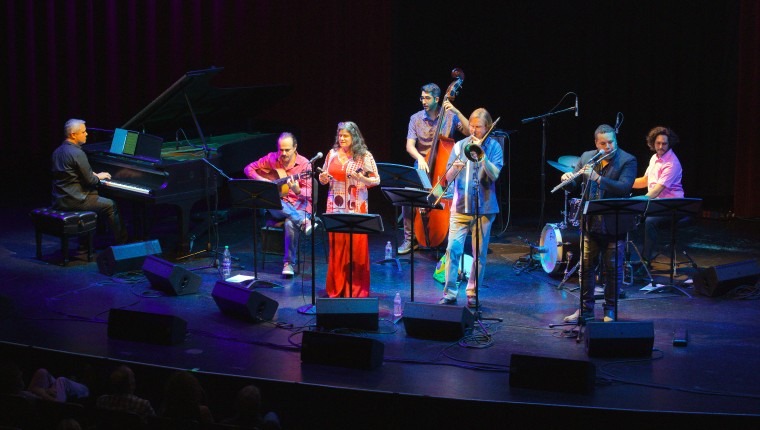. . .
From Soul Jazz to Free Jazz, Smooth Jazz, Neotraditional Jazz, Jam Band Jazz and Hip-Hop Jazz, America’s native classical music has more variants than Loki, with more surely on the way. After all, nothing stops a doom scroller in his tracks faster than a band playing, oh “Amerindian Harmolodic Fusion Jazz” or such.
At first listen, O Som Do Jazz’s Aberto fits comfortably under well-worn catchalls like “Afro-Brazilia” “Tropicalia” and “Brazilian Jazz”. On second listen, not so much.
On this, their fourth release, the Tampa Bay-based Brazilian music troupe refocuses styles like samba and bossa nova in subtle, unexpected ways. A chord progression resolves, then decides not to, the next time around. A theme whimsically appears and reappears. Song structures turn peripatetic just because – well, it’s Tuesday.
“I try not to follow formulas, contrived approaches, or standard changes,” says composer-leader-trombonist David Manson. “A lot of jazz is too cerebral, anyway.”
O Som Do Jazz is clever, but not so clever that they forget what makes Brazilian jazz appealing – pithy melodies, insinuating rhythms, intimate vocals. Which you’d expect from a band with four Brazilian natives in it –singer-lyricist Andrea Moraes Manson (married to David Manson), pianist Bruno Miranda, guitarist Tabajara Belo, and drummer-percussionist Rafael Pereira, who has a road stint with Janelle Monáe on his resume.
Alejandro Arenas handles bass duties, joining Mark Feinman (drums) and Jose Valentino Ruiz (woodwinds). Ruiz takes two standout solo turns on the Sergio Mendes-flavored “So Samba” and “Passaros,” throwing out some outside sax lines on the former and contributing darting flute lines on the latter. Ruiz, Arenas and Miranda take center stage again on “Falar Abobrinha,” riding over Feinman and Pereira’s subtly propulsive rhythms.
“On ‘So Samba,’ I told Jose to do something crazy, and he did,” says Manson. “And I wrote ‘Passaros’ with the flute in mind since it and the trombone complement each other.”
Andrea Manson appears on three tunes and closes the disc with Tom Jobim’s “Foi a Noite.” With lyrics by Newton Mendonça, it’s a well-loved song in Brazil, though generally unknown in the States.
“It’s about someone thinking about rekindling a failed romance, wondering if it’s the moon or the nighttime sea that’s causing these feelings,” Manson says. “Or maybe he just drank too much.”
Andrea Manson penned lyrics for two other songs she appears on – “Cara de Pau” and “Sem Pensar.” They cover the same thematic ground as “Foi a Noite” – romantic yearning, lost romance, love at first sight. But the sonic content is even more important than the words themselves. On “Sem Pensar,” Andrea Manson’s voice floats cloudlike over the musical landscape.
Lyric writers and composers often select words for how they sound, sometimes dispensing with meaning entirely. Talking Heads’ David Byrne crafted lyrics out of random vocalisms on Speaking in Tongues and declared literal meaning “overrated” in a 2010 TED Talk. Volume, inflection and timbre impart meaning in a way that is at once direct and abstract.
“Word painting is an important part of what we do,” he says. Portuguese, Brazil’s dominant tongue, is “really rhythmically interesting and melismatic – it lends itself to jazz composition really well. Sometimes, I compose songs around the lyrics – sometimes, the harmony and melody influence the words.
“Then sometimes I let the chord changes and structures lead me in different directions – which, as I said before, is how true Brazilian music is composed.
“When you dive deep into Brazilian music, you find composers who write from the position of ‘do what sounds good,’ even if it doesn’t follow preconceived notions of what you should or shouldn’t do.”
This approach is the land bridge between the two Mansons – one a relentless advocate for Caribbean and world music, the other a relentless advocate for avant-garde composition, electronic music and free jazz. Imagine Milton Nascimento, Ornette Coleman and Karlheinz Stockhausen sharing the same restaurant bill.
“I just have an evil twin,” Manson laughs. “He’s the one doing stuff like Shim, the EMIT festival or working with (late jazz giant) Sam Rivers.”
“You’d think that Brazilian music and free improv and avant-garde are opposites. But both styles reject standard formulas and cliches regarding rhythm and harmony, in the service of producing something genuine.
“That’s the stuff I like. The real stuff”.



